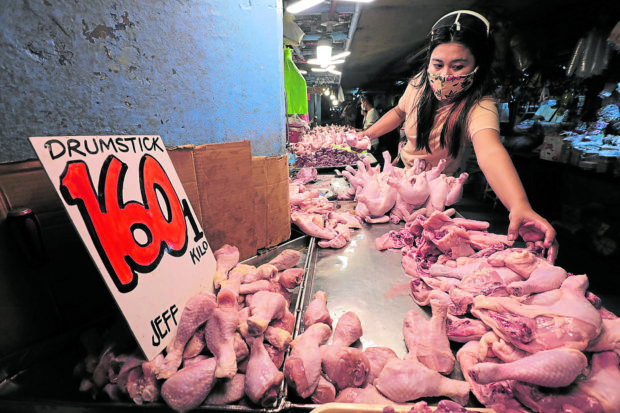
RUNAWAY PRICES A vendor at Pasig Mega Market sells poultry and pork meat on Tuesday as prices soar. —GRIG C. MONTEGRANDE
MANILA, Philippines — Workers, especially minimum wage earners, have expressed outrage at exorbitant food prices and called on the government to rein in runaway price increases.
Partido Manggagawa (PM) president Rene Magtubo observed that in Metro Manila, the price of a kilo of pork was now equivalent to seven hours of work for a minimum wage earner.
A kilo of cabbage, eggplant, string beans or ampalaya was worth three hours of work while a kilo of galunggong was equivalent to the minimum wage for a half a day’s work, he said.
“Outside the National Capital Region, the price of a kilo of pork is higher than the minimum wage. How can the jobless afford that?,” Magtubo asked.
The legislated daily minimum wage in Metro Manila is P537 but when adjusted for inflation, it goes down to P434 (real daily minimum wage).
Varying per region, the nominal daily minimum wage outside NCR ranges from P310 (Bicol) to P420 (Central Luzon), for a real daily minimum wage of P234 and P333, respectively.
According to Magtubo, the price monitoring report of the Philippine Statistics Authority showed that the prices of meat and vegetables this month rose by 50 to 275 percent compared to January last year.
“Even if there’s a COVID-19 vaccine coming, this will not take away the people’s hunger,” he said.
Associated Labor Unions (ALU) vice president Gerard Seno said that workers, especially those receiving minimum wages, were outraged by the steep hike in the prices of basic food items such as rice, vegetables, meat and liquefied petroleum gas.
He noted that the prices of basic commodities rose in December despite the 60-day price freeze imposed by a multi-agency government task force from Nov. 18, 2020 to Jan. 17.
ALU called on the Department of Agriculture (DA) and Department of Trade and Industry (DTI) to bring down as soon as possible to “reasonable levels” the prices of basic commodities.
“Government agencies have already identified the gaps and problematic layers giving rise to these runaway prices of basic food commodities,” Geno said.
“The DA and the DTI now have to step up their price regulation mandate and level up their enforcement to further improve protection of consumers, particularly against profiteers, supply hoarders and middlemen victimizing retailers and ordinary people,” he stressed.